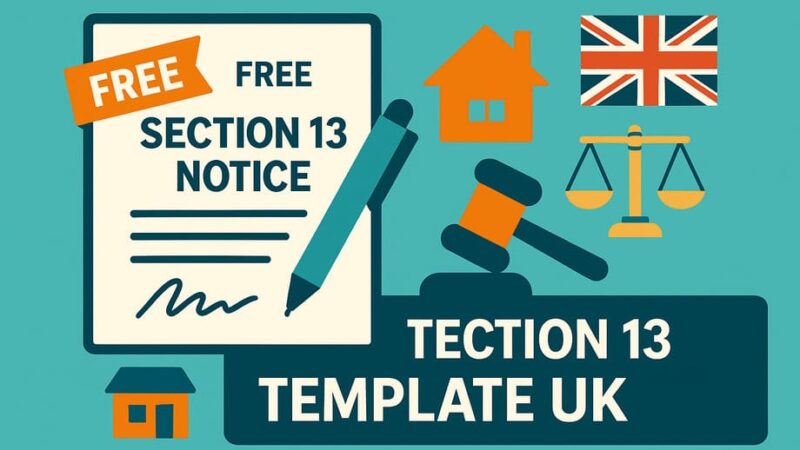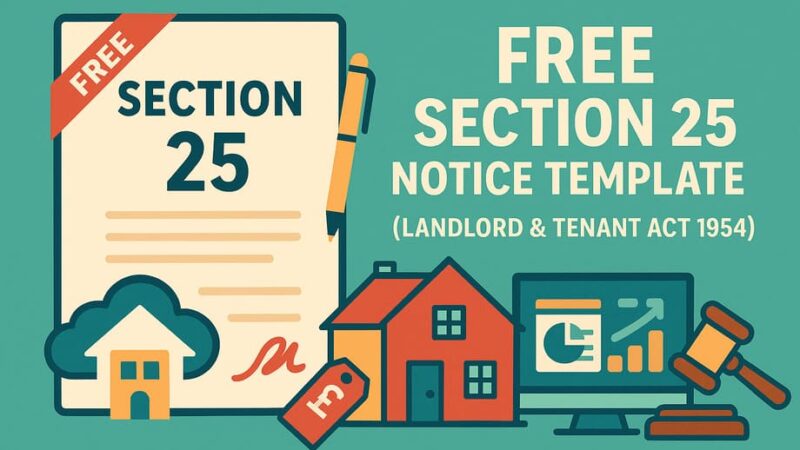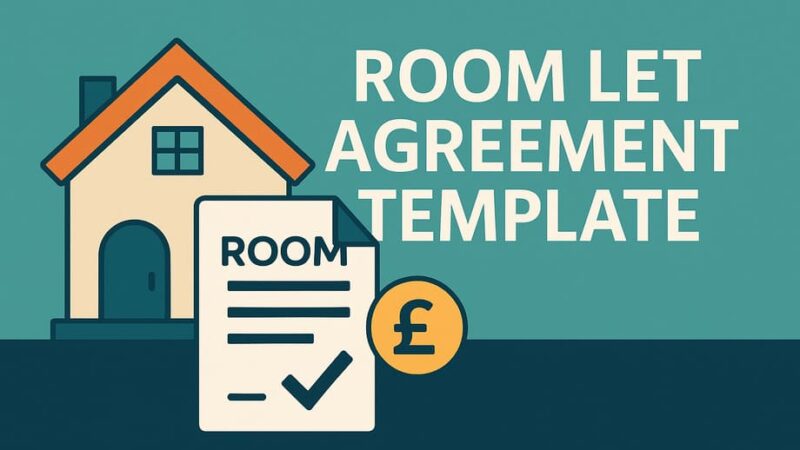Letter to Tenant to Vacate Property UK – (Free Template)

When landlords need tenants to vacate their property, understanding the correct legal procedures and using appropriate letters is crucial for protecting your interests and avoiding costly mistakes. Whether you’re dealing with the end of a fixed-term tenancy, rent arrears, or property breaches, sending the right type of notice ensures you follow UK housing law while maintaining professional landlord-tenant relationships.
This guide provides free letter templates for asking tenants to vacate property in the UK, covering both informal requests and formal legal notices. We’ll explain when you can ask tenants to leave, the differences between legal and informal letters, and how much notice you must provide under different circumstances.
When Landlords Can Ask Tenants to Leave
Understanding when you can legitimately ask tenants to vacate is fundamental to avoiding illegal eviction claims and ensuring you follow proper procedures under UK housing law.
End of Fixed-Term Tenancy
Natural Expiry of Agreement When fixed-term assured shorthold tenancies reach their agreed end date, landlords can choose not to renew and request possession of their property. However, simply writing a letter asking tenants to leave isn’t sufficient – you must follow formal notice procedures even when tenancies expire naturally.
If tenants remain after the fixed term expires without a new agreement, the tenancy typically becomes periodic (rolling month-to-month) and continues under the same terms. You still need to serve proper legal notices to regain possession.
No Automatic Right to Possession Many landlords mistakenly believe they automatically regain possession when fixed terms end. In reality, tenants have the right to remain until you serve proper legal notices and, if necessary, obtain court orders for possession.
Tenant Breach Situations
Rent Arrears When tenants fall behind with rent payments, you can ask them to leave using fault-based eviction procedures. However, the amount of arrears and timing of your notice affects which legal procedures you can use and how quickly you can regain possession.
For serious rent arrears (typically 8+ weeks for weekly tenancies or 2+ months for monthly tenancies), you can use expedited legal procedures. For smaller arrears, different notice periods and legal requirements apply.
Property Damage and Neglect Tenants who cause damage beyond normal wear and tear, neglect property maintenance obligations, or allow the property to deteriorate may face eviction proceedings. Document damage thoroughly and ensure breaches are serious enough to justify possession proceedings.
Antisocial Behavior Persistent noise problems, neighbor complaints, or illegal activities on the property can justify asking tenants to leave. However, you need substantial evidence including neighbor statements, police reports, or local authority involvement to support possession claims.
Tenancy Agreement Violations Breaches like unauthorized pets, subletting without permission, or using the property for prohibited purposes can justify eviction proceedings. Ensure your tenancy agreement clearly prohibits these activities and that violations are serious enough to warrant possession action.
Landlord Circumstances
Property Sale Requirements Needing to sell the property with vacant possession is a legitimate reason for asking tenants to leave, but you must follow proper notice procedures and cannot force tenants out simply because you want to sell.
Family Occupation Needs Requiring the property for yourself or family members may justify possession proceedings, though specific legal grounds and notice requirements apply depending on your tenancy type and circumstances.
Major Renovation Projects Extensive refurbishment that makes the property uninhabitable may justify possession, but you must prove the work is necessary and cannot be completed with tenants in residence.
Legal vs. Informal Letters
Understanding the crucial difference between informal requests and formal legal notices prevents costly mistakes and ensures you use appropriate procedures for your situation.
Informal Letters – When and Why to Use
Friendly First Approach Informal letters asking tenants to consider leaving voluntarily can be appropriate in certain circumstances, particularly when you have good relationships with responsible tenants who might be willing to cooperate with your plans.
These letters work best when you can offer incentives like flexible moving dates, assistance with moving costs, or positive references for future rentals. However, informal requests have no legal force and tenants can simply ignore them.
Advance Notice of Formal Procedures Some landlords use informal letters to give tenants early warning that formal legal notices will follow, particularly when fixed terms are approaching expiry. This approach can help maintain relationships while giving tenants time to plan their move.
Limitations and Risks Informal letters cannot create legal obligations for tenants to leave and may actually weaken your position if they contain incorrect legal information or inappropriate pressure. Never threaten illegal eviction or suggest tenants have no rights to remain.
Informal approaches work best when combined with proper legal procedures and should never be used as substitutes for required legal notices.
Formal Legal Notices – Essential Requirements
Section 21 Notices for No-Fault Evictions Section 21 notices allow landlords to regain possession without proving tenant fault, but they have strict legal requirements including minimum 2-month notice periods, specific prescribed forms, and prerequisite compliance with deposit protection and safety regulations.
These notices can only be served after tenancies have been running for at least 4 months and require landlords to have provided tenants with prescribed information, energy performance certificates, gas safety certificates, and the current “How to Rent” guide.
Section 8 Notices for Fault-Based Evictions Section 8 notices require proving specific grounds for possession such as rent arrears, property damage, or tenancy breaches. Different grounds have different notice periods (from 2 weeks to 2 months) and evidence requirements.
Section 8 procedures can often be started during fixed-term periods if tenancy agreements include appropriate forfeiture clauses, making them useful for addressing serious problems quickly.
Legal Consequences of Improper Notices Using incorrect forms, providing insufficient notice periods, or failing to meet legal requirements can invalidate notices entirely and require starting procedures again. This delays possession and may result in additional rent loss and legal costs.
Courts strictly enforce notice requirements and will dismiss possession claims based on defective notices, regardless of how strong the underlying case might be.
Free Letter Templates
Here are professional templates for different situations when asking tenants to vacate:
Informal Letter Template (Friendly Request)
[Your Name]
[Your Address]
[City, Postal Code]
[Phone Number]
[Email Address]
[Date]
[Tenant's Name]
[Property Address]
[City, Postal Code]
Dear [Tenant's Name],
Re: [Property Address] - Request to Consider Early Vacation
I hope this letter finds you well. I am writing to discuss the future of your
tenancy at the above property.
REASON FOR REQUEST:
[Choose appropriate reason:]
• I need to sell the property and require vacant possession
• I require the property for family occupation
• I plan major renovations that require vacant possession
• [Other specific reason]
I understand that your current tenancy agreement runs until [end date], and
I want to emphasize that you have every right to remain until that date.
However, I wanted to explore whether you might be willing to consider
vacating earlier to assist with my plans.
WHAT I CAN OFFER:
To make this transition easier for you, I would be happy to discuss:
• Flexible moving dates that suit your schedule
• [Amount] towards your moving expenses
• An excellent landlord reference for your next property
• Return of your full deposit promptly upon satisfactory vacation
• Assistance finding alternative accommodation
NEXT STEPS:
If you're interested in discussing this possibility, please contact me on
[phone number] or [email address]. There is absolutely no pressure, and
if you prefer to remain until your tenancy naturally expires, I completely
understand and will respect your decision.
If you choose to stay, I will need to serve formal notice in accordance
with legal requirements at the appropriate time.
Thank you for being such a good tenant, and I look forward to hearing
from you.
Kind regards,
[Your Signature]
[Your Printed Name]
[Date]
Pre-Notice Warning Letter (Formal End of Tenancy)
[Your Name]
[Your Address]
[City, Postal Code]
[Phone Number]
[Email Address]
[Date]
[Tenant's Name]
[Property Address]
[City, Postal Code]
Dear [Tenant's Name],
Re: [Property Address] - Notice of Intention Not to Renew Tenancy
I am writing to give you advance notice that I do not intend to renew your
tenancy agreement when it expires on [end date].
CURRENT TENANCY STATUS:
• Tenancy start date: [date]
• Current tenancy end date: [date]
• Tenancy type: Assured Shorthold Tenancy
FORMAL NOTICE TO FOLLOW:
Please be aware that I will be serving formal legal notice requiring
possession of the property in accordance with UK housing law. This notice
will specify the legal requirements and timeframes involved.
REASON FOR NON-RENEWAL:
[Choose appropriate reason:]
• I require the property for family occupation
• I intend to sell the property
• I plan to undertake major renovations
• [Other legitimate reason]
WHAT HAPPENS NEXT:
1. You will receive formal legal notice (Section 21) within [timeframe]
2. This will specify the earliest date you must vacate the property
3. You will have minimum 2 months from service of formal notice
4. I will arrange property inspections and check-out procedures
YOUR RIGHTS:
• You have the right to remain until formal notice expires
• You have the right to seek housing advice from local authorities
• You have the right to challenge any notice if you believe it's invalid
• Free advice is available from Shelter (0808 800 4444) or Citizens Advice
SUPPORT AVAILABLE:
If you need assistance finding alternative accommodation or have questions
about the process, please contact me. I am happy to provide references
and work with you to ensure a smooth transition.
Please acknowledge receipt of this letter and contact me if you have any
immediate questions.
Yours sincerely,
[Your Signature]
[Your Printed Name]
[Date]
IMPORTANT: This letter is not formal legal notice. Formal notice will
follow using prescribed legal forms.
Rent Arrears Warning Letter
[Your Name]
[Your Address]
[City, Postal Code]
[Phone Number]
[Email Address]
[Date]
[Tenant's Name]
[Property Address]
[City, Postal Code]
URGENT: RENT ARREARS - IMMEDIATE ACTION REQUIRED
Dear [Tenant's Name],
Re: [Property Address] - Outstanding Rent Arrears
I am writing regarding serious rent arrears on your tenancy account that
require immediate attention.
CURRENT ARREARS POSITION:
• Monthly rent: £[amount]
• Last payment received: [date] - £[amount]
• Current arrears: £[total amount]
• Period covered: [dates of missed payments]
PAYMENT DEMAND:
You are required to pay the outstanding amount of £[total] immediately.
Payment must be received by [date - usually 7-14 days from letter date].
CONSEQUENCES OF NON-PAYMENT:
If payment is not received by the deadline above, I will have no choice
but to commence legal proceedings to:
• Recover the outstanding rent
• Regain possession of the property
• Recover legal costs and court fees
LEGAL ACTION WARNING:
Formal eviction proceedings will be started using Section 8 of the Housing
Act 1988. If rent arrears exceed [8 weeks/2 months], the court must grant
possession if the arrears are proven.
PAYMENT OPTIONS:
Please contact me immediately on [phone] to discuss:
• Immediate full payment arrangements
• Acceptable payment plan proposals
• Housing benefit or universal credit applications
SUPPORT AVAILABLE:
If you're experiencing financial difficulties, free debt advice is available
from:
• Citizens Advice: 0800 144 8848
• StepChange: 0800 138 1111
• National Debtline: 0808 808 4000
URGENT ACTION REQUIRED:
Contact me within 48 hours to avoid formal legal proceedings. I am willing
to discuss reasonable payment arrangements if you engage promptly.
Yours sincerely,
[Your Signature]
[Your Printed Name]
[Date]
NEXT STEPS: If no contact within 48 hours, Section 8 notice will be served.
How Much Notice to Give Tenants
Understanding minimum notice periods ensures you comply with legal requirements and avoid invalidating your possession claims.
Section 21 Notice Periods
Standard Two-Month Minimum Section 21 notices require minimum 2 months’ notice from the date tenants receive the notice. The notice period starts the day after service, so serving on January 1st means the earliest possession date is March 1st.
For periodic tenancies, the notice must expire at the end of a tenancy period. If rent is paid monthly, the notice must expire on the same date rent is typically due.
Fixed-Term Considerations Section 21 notices cannot expire before fixed-term tenancies end naturally. If a fixed term runs until June 30th, a Section 21 notice cannot require possession before July 1st, even if you give more than 2 months’ notice.
Longer Notice for Contractual Periodic Tenancies Some tenancy agreements create periodic tenancies with notice periods longer than 2 months. In these cases, you must give the longer contractual notice period rather than the statutory minimum.
Section 8 Notice Periods
Ground-Specific Requirements Section 8 notice periods depend on which grounds for possession you’re using:
- Serious rent arrears (Ground 8): 2 weeks minimum
- Some rent arrears (Ground 10): 2 weeks minimum
- Persistent late payment (Ground 11): 2 weeks minimum
- Property damage (Ground 13): 2 weeks minimum
- Antisocial behavior (Ground 14): 2 weeks minimum or immediate for serious cases
Immediate Possession Grounds Some serious grounds like illegal drug use or serious antisocial behavior may allow immediate possession proceedings without any notice period, though these situations are rare and require strong evidence.
Informal Notice Periods
Courtesy and Relationship Management While informal letters have no legal force, giving reasonable notice demonstrates professionalism and helps maintain relationships. Consider giving 1-3 months’ informal notice before serving formal legal notices.
Market Conditions Consideration In competitive rental markets, tenants may need longer to find alternative accommodation. Reasonable informal notice periods can help ensure smooth transitions and positive landlord references.
Incentive Timing If offering incentives for voluntary vacation, ensure timelines are realistic for tenants to arrange alternative accommodation and complete moving procedures.
Related: Section 21 and Section 8 Explained
Understanding the formal legal notice procedures helps you choose the right approach for your situation and ensure compliance with UK housing law.
Section 21 No-Fault Evictions
When to Use Section 21 Section 21 notices work best when you want possession without proving tenant fault, need the property back for legitimate reasons like sale or family occupation, or want certainty of possession without complex evidence requirements.
Section 21 cannot be used during the first 4 months of tenancy, when deposits aren’t properly protected, or when required documents like EPC certificates haven’t been provided.
Prerequisites for Valid Section 21 Before serving Section 21, ensure you’ve protected the tenant’s deposit in an approved scheme, provided prescribed information about deposit protection, supplied current energy performance certificates and gas safety certificates, and given tenants the latest “How to Rent” guide.
Section 21 Process Timeline
- Ensure all prerequisites are met
- Serve Section 21 notice (Form 6A) giving minimum 2 months’ notice
- Wait for notice period to expire
- If tenant doesn’t leave, apply to court for possession order
- If granted, arrange bailiff enforcement if necessary
Section 8 Fault-Based Evictions
When to Use Section 8 Section 8 suits situations where tenants have breached agreements, you need possession during fixed-term periods, or you want to claim rent arrears alongside possession.
Section 8 can often be served earlier in tenancies than Section 21 and may result in faster possession for serious breaches like substantial rent arrears.
Evidence Requirements Section 8 success depends on proving specific grounds with adequate evidence. For rent arrears, maintain detailed payment records. For damage, take photographs and obtain repair estimates. For antisocial behavior, gather neighbor statements and incident reports.
Section 8 Process Timeline
- Document tenant breaches thoroughly
- Serve Section 8 notice (Form 3) with appropriate notice period
- Wait for notice period to expire
- Apply to court with evidence supporting your grounds
- Attend court hearing to prove your case
- If successful, arrange bailiff enforcement if needed
Choosing Between Section 21 and Section 8
Section 21 Advantages
- No need to prove tenant fault
- More predictable court outcomes
- Suitable for end of fixed terms
- Covers various landlord circumstances
Section 8 Advantages
- Can be used during fixed terms
- Shorter notice periods for serious breaches
- Allows recovery of rent arrears
- May be faster for serious violations
Future Changes The UK government plans to abolish Section 21 no-fault evictions, making Section 8 procedures increasingly important for landlords who need possession remedies. Stay informed about legislative changes that may affect your options.
Legal Considerations and Best Practices
Professional Communication
Always Use Written Notice Never rely on verbal requests for tenants to leave, as these have no legal force and create no evidence if disputes arise. All significant communications should be in writing with proof of service.
Maintain Professional Tone Even when dealing with problem tenants, maintain professional, respectful communication. Aggressive or threatening language can undermine your position and may constitute harassment.
Document All Interactions Keep records of all communication with tenants, including dates, methods, and responses. This documentation becomes crucial if possession proceedings reach court.
Avoiding Illegal Eviction
Never Use Self-Help Eviction Changing locks, removing belongings, or cutting off utilities constitutes illegal eviction and can result in criminal prosecution and substantial compensation claims. Always follow proper legal procedures.
Respect Tenant Rights Tenants have the right to remain until proper notices expire and, if necessary, until courts grant possession orders. Attempting to force tenants out through harassment or pressure is illegal.
Get Professional Advice For complex situations, high-value properties, or when you’re unsure about procedures, consider professional legal advice or property management services that specialize in possession proceedings.
Download Your Free Templates
Get your professional letter templates:
- Informal request letter for voluntary vacation
- Pre-notice warning letter for formal proceedings
- Rent arrears demand letter for payment issues
- Section 21 and Section 8 guidance for legal notices
Available formats:
- PDF: Print and complete by hand
- Word: Editable for multiple properties
- Email templates: Digital communication versions
[DOWNLOAD PDF] | [DOWNLOAD WORD] | [LEGAL FORMS]
Legal Disclaimer: These templates provide guidance only and should not be considered legal advice. Eviction procedures involve complex legal requirements that vary by situation. Consider professional legal advice for complex cases or when unsure about proper procedures. Always ensure compliance with current housing legislation and avoid any actions that could constitute illegal eviction.
Need tenants to vacate your property? Download our free templates and follow proper UK housing law procedures to protect your interests while respecting tenant rights.
Last Updated on August 24, 2025 by James Cartwright







![Letter to Tenant for Late Rent Payment [Free Template] 7 Letter to Tenant for Late Rent Payment [Free Template]](https://www.yourpropertyblog.co.uk/wp-content/uploads/2025/08/letter-to-tenant-for-late-rent-payment-template-800x450.jpg)